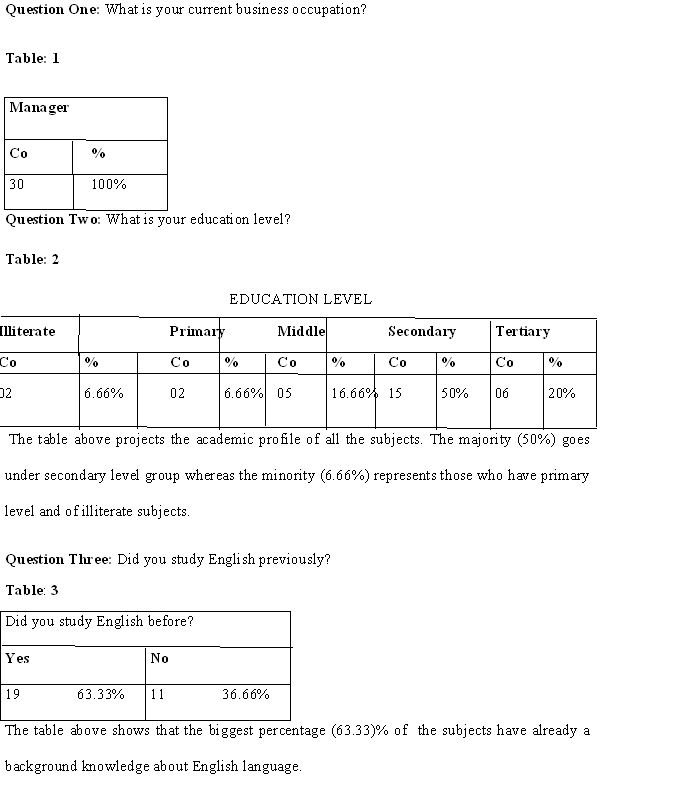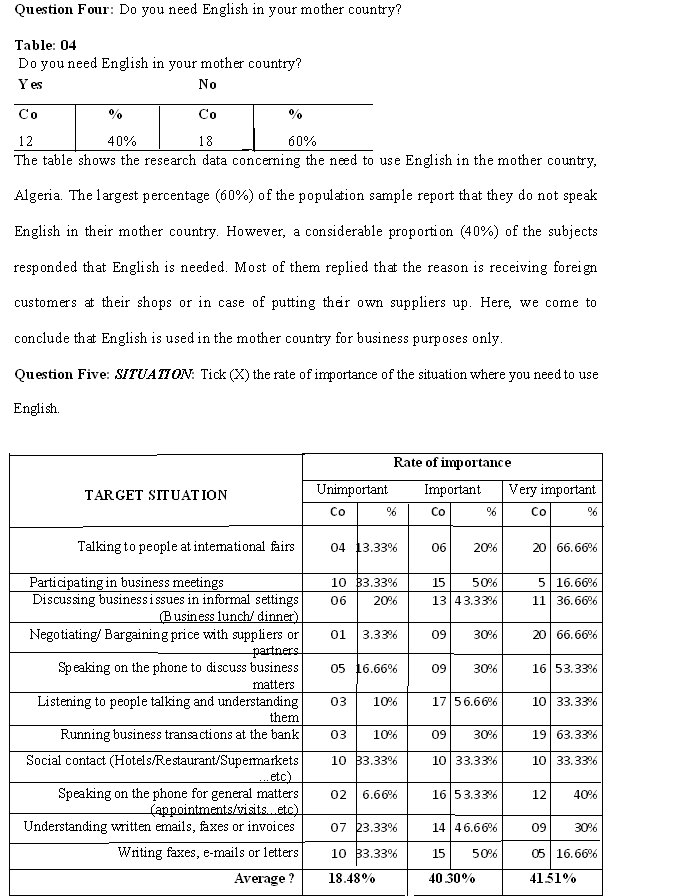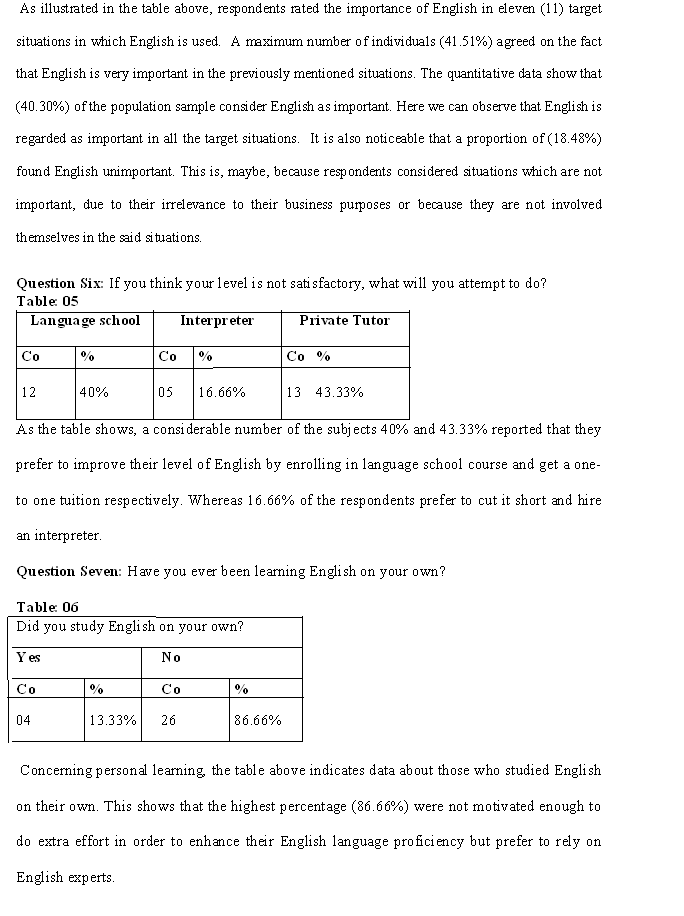Dr. Fouzia Rouaghe
University Sétif 2 – Mohamed Lamine Debaghine
Abstract
“The gradual decrease of enrollment in English classes by male students, which the Algerian university has witnessed, is generally attributed to the fact that English has merely been regarded as a means to write poems, stories, chat on the net or read the latest documents in particular fields. Hence, English, though it is the international language, has become no more a tool for earning money or starting a small business on one’s own. Yet, in this paper we will attempt to illustrate that English has always been more than a communication tool and it can be useful for running a successful enterprise. First, we will have a look at the teaching units taught at the English institution at Sétif university and how we can use them in order to raise learners‘ awareness about entrepreneurship, then we will make a survey on business professionals who lack English background and see whether English is a solid platform for starting a business, and finally we come up with some suggestions and recommendations for university teachers to make of English an excellent asset for business birth and survival.”
Introduction
The gradual decrease of enrollment in English classes by male students, which the Algerian university has witnessed, is generally attributed to the fact that English is regarded as a means for writing poems or stories, internet chatting and last finishing with teaching in case jobs are available. Hence, English, though it is international language, has become no more a tool for earning money or starting a small business on one’s own. Yet, in this paper we will attempt to elucidate that English has been and is still a way for running a successful enterprise in case it is taught appropriately. First, we will have a look at the teaching units taught at the English institution at Sétif university and how we can use them in order to raise learners‘ awareness about entrepreneurship, then we will make a survey on business professionals who lack English background and see whether English is a solid platform for starting a business, and finally we come up with some suggestions and recommendations for university teachers to make of English an excellent asset for business birth and survival.
At the university of Sétif, under the traditional system there has been an average of eleven modules such as linguistics, grammar, written expression, civilization, literature, phonology, oral expression and psychology. With the advent of LMD system, units such as methodology and English for Specific Purposes (ESP henceforth) have been introduced into the first academic year. It goes without saying that the aim of enrolling in English is to be able to communicate fluently with foreigners or to read or write successfully. However, this specialization if taught for meeting only those aims cannot, by any means, lead to commencing a small business on one’s own and it is only used for teaching once jobs are at hand or chatting via the net and social networks. For this reason, I will put much focus on some units of the English curriculum to show that we can exploit them in order to raise consciousness of our learners that English can be an important investment at their hands and they can earn money only through possessing such a language.
1. Grammar and Literature:
They are units which teach how to be an accurate writer and critical reader; as far as grammar is concerned, it is the art that enables someone to speak and write the language effectively. Whereas literature whose components are prose and poetry is the tool that offers much help in knowing how to combine sentences, how to form coherent paragraphs and statements and how to have a good style while writing. Those units help promote reading and writing skills.
As for those units, they can be exploited by English graduates as a means for being a good writer and a correct speaker of the language; they may use it in teaching people who would like to participate in international conferences and they desire to deliver a talk or publish an article in a correct English, for example medical doctors, architects, engineers in all domains. Those units also help in bettering reading of English and deciphering the intricateness of its grammar. English graduates will be then able to read manuals for people who need them in their work place like engineers and opticians, and reading also all documents written in English and translate them to other students of specific fields in which all documents are written only in English.
2. Phonology/ phonetics
It is the study of language sounds, pronunciation intonation, rhythm…. It aims at improving the learners‘ pronunciation and speech overall. This unit is of utility to learners in order to develop their listening and speaking skills.
In addition to the talent of translation that grammar and literature can offer, phonetics can be a good tool for being an interpreter. Good pronunciation helps in making people understand the language one speaks. Besides,, knowing the rules of a correct pronunciation creates a good listener and thus a good speaker or responder. A graduate of English who possesses a good basis in phonetics can work as an interpreter for people who deal with foreigners and cannot respond properly and effectively. A good English pronunciation, is believed, to be a sign of a well-rounded education and casts much credit to the speaker.
3. Linguistics
It is the scientific study of the language. It tackles language learning and teaching theories and how the human beings acquire the language. Linguistics also can provide a full idea about the difference between children and adults as far as the acquisition of English is concerned.
Being good at linguistics means being able to teach children and adults on one’s own; that is to say, a graduate in English can teach children in groups in language center or through home tuition. But for a better income, the teacher gives one-to-one tuition to children who would like to study individually. Linguistics helps the teacher to have a full image about children aptitude for learning a foreign language at an early age; and thus it makes the teacher anticipate difficulties and thus overcome them easily. Similarly, linguistics provides the teacher with a full picture about adult learning and how to deal with them. Learning a language at an advanced age differs from that of an early age and this is also a plus point to the teacher who is now aware; due to linguistics; of how adults acquire the language.
4. English for Specific Purposes (ESP)
4.1. Background
The status of English as an international language which is essential in almost every area of activity is deeply rooted in the history of the world starting at the end of the Second World War which brought with it an «… age of enormous and unprecedented expansion in scientific, technical and economic activity on an international scale; for various reasons, most notably the economic power of the United States in the post-war world, the role [of international language] fell to English“ Hutchinson and Waters (1987, p.6). The general effect of all this development was to exert pressure on the language teaching profession to deliver the required goods. Whereas English had previously decided its own destiny, it now became subject to the wishes, needs and demands of people other than language teachers (ibid, p.7).In addition to that, the focus on the learners and their needs became paramount because general English courses no longer met learners’ needs and wants.
Hutchinson and Waters (1987) point out that one significant discovery was in the ways that spoken and written English vary. In other words, given the particular context in which English is used, the variant of English will change. This idea was taken one step further; if language in different situations varies, then tailoring language instruction to meet the needs of learners in specific contexts is also possible. Therefore, in the late 1960s and the early 1970s there was a pressing need to introduce English for Specific Purposes (ESP).
4.2. Types of ESP
According to Carver (1983), ESP is divided into English for Academic and Occupational Purposes; he indicated that this English should be at the heart of ESP and ought not to undergo any further development. Furthermore, Hutchinson & Waters (1987) designed ‚Tree of ELT‘ where ESP is broken down into three branches: a) English for Science and Technology (EST), b) English for Business and Economics (EBE), and c) English for Social Studies (ESS). Each of these subject areas is further divided into two branches: English for Academic Purposes (EAP) and English for Occupational Purposes (EOP). An example of EOP for the EST branch is ‚English for Technicians‘, whereas an example of EAP for the EST branch is ‚English for Medical Studies‘.
What interests us, actually, is EOP means English for professionals who are generally adults and are in need of English for their professional career. EOP is divided into English for professional purposes (EPP) and English for vocational purposes (EVP). The former means English needed by those who already have a profession but exercised it in a language other than English, so in addition to explore further opportunities abroad, they need English for improving their level and dealing with foreigners who speak English as their native language or as a lingua franca. For instance, Algerian medical doctors whose education was in French would like to go to USA or Britain to work; in this case they have to enroll in English classes in order to get admitted by the host country. It is the same for dentists, architects, engineers, opticians… etc. as for EVP, it is English needed for earning money such as waiter, hairdresser, accountant… etc. the aim of this unit is to show how to provide adequate lessons to those adult learners who need English for their professional life.
Teachers of ESP can raise their learners‘ awareness that they can benefit from this module; for instance they would be able to gather a group of doctors or engineers either at home or in a private institution; analyze their needs through asking questions or interviews in order to know why, when, where, for what purpose English is needed and wanted. ESP slogan is generally, tell me what you need English for I will tell you the English that you need. One to one tuition is also needed by people who do not like to join a group and in this case a graduate in English can earn double tuition fees.
5. Skills needed for a Good Business
5.1. Language and Communication Skills
Language is the basic element for communication between human beings. Though paralanguage is also useful in communication, it can, by no means, be verbal or written as it takes place only face-to face. Whereas language is a vital means for conveying a message either orally (face-to –face or distant via telephone) or written (via board, letters, emails, faxes, etc).
Smeltzer and Leonard’s (1994) conception of communication skills includes the ability to encode, decode, receive feedback, and adjust to noise. It was found out, according to them, that the best communication takes place when both sender and receiver are skilled communicators.
It is worth mentioning that communication skills mainly include language skills, but are not similar albeit the difference between them is almost always taken for granted. Smeltzer and Leonard (op. cit.: pp. 39-43) point out that communication skill is the overall ability of an individual to communicate for understanding. In addition, they examine six factors which, according to them, create unique individual filters and affect communication. They are knowledge, culture, status, attitude, emotion, and communication skills.
During communication, linguistic and non- linguistic skills (memory, recalling and comprehension abilities (Ellis, p.1992) gather to contribute to decoding as well as encoding of a message in the communication process. Ellis (op. cit.: p.146) notes that highly skilled communicators are able to make intelligent decisions about their messages and control the communicative code well enough for successful outcomes.
In business setting, communication is basically a required performance of business professionals. Communication skills are not essentially innate but can be developed through language skills and communication faculties which are much related. When language skills are necessary for communicative skills, the latter can be acquired through approximate development of the former. „The acquisition of linguistic skills does not seem to guarantee the consequent acquisition of communication abilities in a language“. (Widdowson, 1978, p.67)
Basically, there are four language skills: speaking, listening, reading, and writing. Speaking and listening arewws expressed through aural medium. Reading and writing are concerned with the visual medium. Speaking and writing are active or productive skills, but reading and listening are receptive or passive language skills (ibid, p.57). All in all, the four language skills serve to some extent the development of communicative skills.
Being able to develop language skills, English graduates are now aware that communication skills are of paramount importance for people who would like not to be fluent speakers or writers of English but those who just desire to convey a message and make themselves understood either via speaking or writing (emails, faxes, letters…etc).
6. Additional Assets for a Better Career
-
-
Good knowledge of French: not necessarily a degree
-
Being a francophone country, French is widely spoken in Algeria and for this reason; having a good command of French could be beneficial in these prospective contexts:
-
To translate written works from English into French or the other way round
-
To interpret spoken English language to francophone people or to interpret French to Anglophones
-
To work for foreign companies as a translator and get remunerated via money transfer to one’s account. (case of Japanese company in Sétif)
6.2. Good knowledge of computing: not necessarily a degree
-
Designing websites in English for foreign companies settling in Sétif or Algeria
-
Looking, via the net, for companies which are in need to extend their international markets and invest in Algeria.
-
Downloading manuals or programs for learners of special purposes.
-
Creating one’s own manual written on PDF, Word, or in any other program format.
-
Scientific Evidence
To back up the claim aforementioned, we have opted for a survey to collect data about whether business professionals in El Eulma Dubai hypermarket are really in need of English for their business survival.
7.1. Data collection: Businessmen at El Eulma Business District-Dubai-
A questionnaire was handed to 30 trade professionals at their shops. It contained 7 questions that targeted data acquisition. Informants were adult males, possessing a trade register and speaking Arabic as a mother tongue; they share the same background but they vary as far as age and education level are concerned.
7.2. Data analysis: Businessmen at El Eulma Business District-Dubai



According to the findings of the questionnaire, businessmen are in need of English in running their business, though money is available, English is considered as an important asset for business birth and survival. Businessmen consider themselves illiterate without English; it is of quite importance in the field of business for haggling over prices, attending fairs and conferences, dealing with foreign suppliers and clients…etc.Hence, businessmen are seeking interpreters who translate from English to Arabic or the other way round, and they also prefer one to one tuition by a teacher of English.
Additionally, traders also explained that English is very important in their field work, and they are stuck without it, even for social purposes abroad when they go to sign deals with their foreign partners. They think that money is important to start business, but English is also an important asset that has to associate funds.
Hence, role of teachers of English is to make learners know that outside the class wall earning money is possible. Opportunities are available to translate or teach those who own money but lack knowledge. They should be encouraged to take a step further and start their own business with knowledge in order to earn money.
References
-
Carver, D. 1983. Some Propositions about ESP. English for Specific Purposes, 2, 131-137.
-
Ellis, D. G. 1992. From language to Communication. Hillsdala NJ: Lawrence Erlbaum Associates.
-
Hutchinson, T. & Waters, A. 1987. English for Specific Purposes: A Learning Centered Approach. Cambridge: Cambridge University Press.
-
Smeltzer, L. & Leonard, D. 1994. Managerial Communication. Boston: Irwin/ McGraw-Hill.
-
Widdowson, H.G. 1978. Teaching Language as Communication. Oxford: Oxford University Press.
